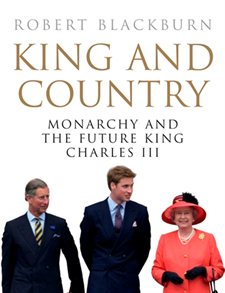What is the Role of the Monarchy in Modern Britain?

Since the early 1990s there has been growing public and political debate on the subject of modernising the monarchy, one concern being that the ancient rules on royal succession, particularly those concerning male primogeniture and religious disqualification, were increasingly distant from the expectations of UK society. However, constitutional law reform on matters relating to the monarchy is highly complex, involving the common law, custom and statutes going back hundreds of years.
Robert Blackburn, Professor of Constitutional Law in The Dickson Poon School of Law, has worked on research and interventions which have directly informed a historic legislative change: the Succession to the Crown Act 2013. This Act reformed the law to remove male preference in the line of succession, to remove disqualification from the throne arising from marriage to a Roman Catholic, and to limit the requirement for the monarch's permission to marry to the six persons next in line to the throne.
As contributor of the Halsbury’s Laws titles on The Crown & Royal Family, Constitutional & Administrative Law, and Parliament, Professor Blackburn is an authority on this subject, and has written on the law of the monarchy since the early 1990s. The primary research underpinning his contribution to the 2013 Act was conducted between 2003 and 2006 and published in his monograph King and Country (2006), which presented recommendations for modernisation and reform.
In this book, Professor Blackburn examined the ancient common law doctrine of male primogeniture as applied to royal succession and argued for its repeal, contending that laws relating to the royal Head of State had great symbolic importance and must evolve to reflect changing social values about equality. He also analysed the ancient legal and religious duties imposed on a monarch, notably that he or she cannot be or marry a Roman Catholic. Professor Blackburn studied the anomaly of Catholicism being singled out for disqualification for political reasons in the 1689 and 1701 statutes, and what this signified today. He also examined the Royal Marriages Act 1772 which declared the marriage of any descendent of King George II to be void unless they first obtained formal consent from the reigning monarch, and argued for its repeal.
Professor Blackburn's research and writings, including King and Country, were quoted in House of Commons Library papers given to MPs and peers prior to parliamentary debates on the subject during the six years between publication of his 2006 book and preparation of the Succession to the Crown Act 2013. During this period, Professor Blackburn also presented his research in public talks, including a public lecture in March 2007 at the Institute of Advanced Legal Studies, and at a joint King's College London/Ipsos-MORI conference on the monarchy in November 2012. He has also spoken or written in the media on royal succession and modernisation issues on numerous occasions.
Shortly after the Coalition government announced its intention to introduce the Succession to the Crown Bill, Professor Blackburn was requested to give oral evidence to the House of Commons Political and Constitutional Reform Committee on 10 November 2011 as one of only two experts. He was author of the only written memorandum of evidence for the Committee on the subject published in its Report.
The final provisions of the Act reflect closely the detailed research, analysis and proposals in Professor Blackburn's book. In particular Section 1 superseded the common law doctrine of male primogeniture, which reflected his argument that the law relating to the royal Head of State was of great symbolic importance and must evolve to reflect changing social values. Section 2 retrospectively applied removal of disqualification from marriage to a Catholic where the person concerned is alive. The Royal Marriages Act of 1772 was repealed and Section 3 introduced a new statutory provision limiting the need for such consent to a small number of persons closest in line to the throne, whilst removing the requirement, as Professor Blackburn had argued, for all descendants of George II to have the Monarch’s permission.
The 2013 Act modernises and stabilises an institution that is a cornerstone of the UK’s constitution and holds significant symbolic meaning for many UK and Commonwealth citizens. A senior parliamentarian describes Professor Blackburn’s contributions to the Act as being ‘material and valuable contributions’ to some of the ‘most important constitutional reforms in the history of the UK’.